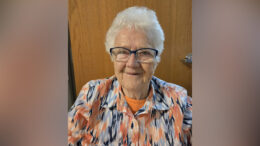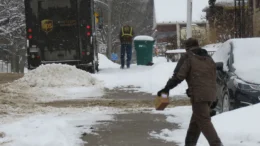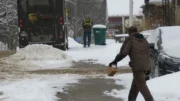Close to 50 firefighters and elected officials attended the second joint meeting of the Oil City and Franklin city councils on Wednesday to discuss moving forward with a state funded study of the fire service situation in parts or all of Venango County.
The gathering at Venango Technology Center was a follow up to a lengthy, well-attended meeting in January that dealt with the same subjects.
Franklin, Oil City and Sugarcreek Borough have all signed letters of intent to move forward with a study by the state Department of Community and Economic Development (DCED) to look at the municipalities’ fire and EMS situation.
Terri Cunkle, a local government policy specialist with the Pennsylvania DCED, said the study doesn’t cost the municipalities anything and the state will hire a consultant to come in and conduct the study.
Cunkle noted the study could be fire service only or fire and EMS service if it is requested by the municipalities.
“The study reviews everything — finances, call volume…It is not cookie cutter,” Cunkle said. “The study will give recommendations. That is not the state telling you what to do. At the end of the study the information will be presented at a public meeting. Then you take it and run with it,” she added.
Municipalities that sign a letter of intent to be part of the study and fire departments that are asked for information need to be willing to follow through by gathering information and spending several hours talking with the consultant, Schroyer said.
Schroyer said at Thursday’s Oil City Council meeting that the study could take four to six months.
“For the study to work they need good information, otherwise it’s just garbage in, garbage out,” Franklin city manager Tracy Jamieson said Wednesday.
A deadline of June 10 for turning in the letters of intent was discussed.
Cunkle said the letter of intent could come from the county for a county-wide study, but the DCED needs to know the buy-in from the municipalities and would need letters of intent from them as well.
The letter of intent is a simple one-page form that must be filled out by municipal officials and turned in to the state, Cunkle said.
County commissioners Mike Dulaney and Albert Abramovic said they would contact the municipalities about the study and letters of intent and bring up the matter at the next Venango County Council of Governments meeting. They also urged the fire departments to go to their respective municipalities and urge them to sign on to the study.
Even if the state bears responsibility for fixing the problems the fire departments are facing, as some present at the meeting had said, they won’t come in “with a pot of money” and fix things, Schroyer said.
“This needs fixed by local officials, they need to get their heads out of the sand,” Schroyer said.
Schroyer reiterated several times that it is not sustainable or fair for the Oil City Fire Department to back up other municipalities, at times arriving on a scene in another municipality before the volunteer department in that municipality shows up.
When the issue of funding fire departments came up, Cunkle asked how many municipalities had a fire tax. She noted that municipalities are allowed to tax up to three mills for fire and one and a half mills for EMS.
An additional fire service fee may be assessed on buildings, similar to a stormwater fee.
Only Cornplanter and President townships have a fire tax, it was noted. Abramovic added that Clintonville has approached Irwin Township about levying a fire tax.
“Dollars don’t ride a fire truck. It’s irritating to me that we are talking about taxing everybody but what do we do with the money? What is the end game?” Oil City fire chief Derek Long said.
Reno fire chief Bob McClintock and several other people made the point that money won’t fix the problem of being unable to recruit and retain new, younger volunteers as the current firefighters continue to get older.
Finding people to fill paid positions at the Oil City police and fire departments is very difficult, Schroyer said.
McClintock noted the more than 184 hours of training a volunteer must go through to become a firefighter is a big hurdle to recruitment. McClintock said he had 16 hours of training when he became a firefighter many years ago.
Cunkle said getting enough people to volunteer and show up to calls is the number one issue she hears from various fire departments and municipalities she talks to across the state. She said she doesn’t have an answer to that question.
Schroyer adjourned the session after it had gone two hours, and another meeting was tentatively scheduled for late July.



































